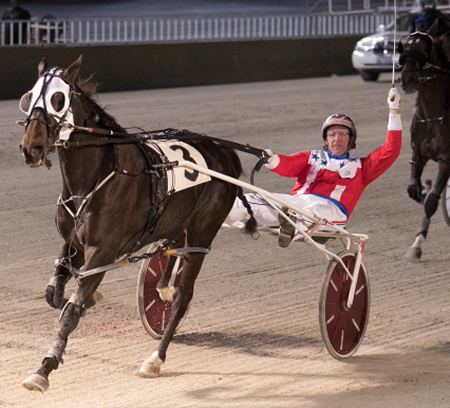
Trenton, NJ — When harness racing driver Casey Leonard graduated from Western Illinois University 21 years ago and entered a career in warehousing and supply chain management, he never dreamed he would be discussing his “racing reflections” two decades later.
But the Illinois native, who turns 44 next month, has plenty to reflect on in harness racing after fate altered his career path in January 2001.
His most recent pleasant memory came on July 3 when the driver scored his 3,000th career win at Hawthorne Race Course with Cracklin Rosie. His simple synopsis of that race was “I had her out in front.”
It was his 1,000th on a Friday night in 2013 that Leonard looks back on with the most vivid recollection — if only because it guaranteed wife Maureen did not have to make another extensive drive on Saturday.
“I remember it was with Fox Sally Libero at Maywood,” he said. “My wife was there to see me get my 1,000th, I had several favorites. I don’t remember if I won three or four (it was three), but I won a couple early and then there was a dry spell. And then it rained. I had one more drive and it was from the seven or eight hole. I circled the field and won the last race of the night. My wife was very glad because she didn’t have to drive to Balmoral the next night.”
What Leonard failed to recall is his horse was a 44-1 longshot, and according to a written account of that night, he did not win early but lost two tough races; and had to win three of the evening’s final four to reach his milestone.
Either way, it was a load off his mind.
“The 1,000th was definitely the hardest,” Leonard said. “That’s when people would kind of tiptoe around you. A thousand is way harder than three thousand. When you’re a kid you never dream you’re going to win a thousand races. Once you kind of get established the numbers just keep piling up.”
Three years later there was not as much drama as the reinsman guided Uncle Bud to his 2,000th victory at Hawthorne, where he is the leading driver.
“I just remember the horse’s name in that one,” he said. “I don’t remember the race.”
Leonard’s first win came in 1996 at the Elkhorn (IL) Fair but he really didn’t hit the driving circuit hard until 2009. In fact, the majority of his wins have come since then, as his Standardbred interest was interrupted by college and work.
He began with horses as a kid on the family farm, helping his dad, Terry, and his uncle, Gary. His earliest recollections had nothing to do with actual horses.
“I remember one of my first jobs on the farm was to sit on the elevator and I was the kicker up in the hay loft,” Leonard said. “I kicked off to either side to the guys so they could stack them.”
From there, he and brother Ross migrated to the animals.
“I started jogging horses when I was 8 or 9 years old,” he said. “Saturdays, that’s what we did. We went on the farm, my grandma always brought donuts. We’d go out there, jog a couple horses, make mud, and clean water buckets and stuff like that. I guess I didn’t hate it or love it. I didn’t think anything of it. It was just growing up on a farm, being a farm kid.”
He has no stark memory of the first time he jogged a horse, just saying “I remember sitting on my dad’s lap, that’s when we started. I don’t remember the horse’s name or anything like that. It was just about like anybody else; I started on my dad’s lap and eventually jogged a couple easy ones.
“We rode ponies and stuff,” he continued. “My grandpa and grandma had a pony riding business and we always had ponies around. We rode a lot of horses. Training was by far what I remember being the biggest challenge. The first time I’d go a training mile with my dad and uncle, I’d screw up, get hollered at, and try to get better each time. I remember how hard it was the first couple times, and how easy it is now, and you take it for granted.”
The first horse that truly sticks in Leonard’s mind was one by the name of Herby Letsgo.
“He’s probably the horse that really got me and my brother the bug,” Casey said. “He was a nice-bred horse, he was a Jate Lobell that we ended up doing OK with. He won a few races. He was just a conditioned claimer, a big, nice horse to be around. He’s kind of where we cut our teeth. He had some ailments, we had to rub on him all the time. We were a little older, 16 or 17, by the time he was around.”
Leonard may have caught the bug, but college proved to be a bit of a cure for it. Once he graduated, the horses were not his first priority.
“Going to college and getting a degree was never a doubt, that was the path I was going on,” he said. “I figured having a career was a logical step. In my head, it didn’t make sense to spend four years in college to race horses, but I know people do it. Ross never went to college, so he was kind of the heir apparent, I didn’t have that much interest in it. Those four years in college I kind of checked out. I was really interested in doing something different.”
Casey didn’t totally ignore the sport. During the summers he and his cousin would race at the Wisconsin fairs.
“It was a more a beer drinking expedition,” he said with a laugh. “We’d take some of the horses that needed a little more experience. The Wisconsin fairs weren’t a bad circuit. There was a fair every weekend, it was a big deal. The Walworth County Fair was one of the bigger Wisconsin fairs. We used to race three days there. That’s where I started driving, so I never was completely disconnected from it. It just wasn’t what I wanted to do then.”
But when uncle Gary died suddenly of a heart attack on the racetrack, Casey felt the need to return home and be with his family in January 2001.
“I wasn’t in love with (the supply chain management career) like I hoped I would be,” Leonard said. “It was a really hard time for our family. It was a shock to the system; my uncle wasn’t sick or anything. Obviously, that’s where you want to be when something that tragic happens. I was as close to my uncle as a kid could be to their uncle. He was a big part of our lives.
“I didn’t really know if I would stay home. I didn’t know how it would turn out. I was just like any other 23-year-old kid, they think they’ve got the whole world figured out but don’t know anything, I guess I was just there to help. I just really wanted to take care of our own horses and take care of the farm.”
But a funny thing happened over the next eight years. Some of the top midwestern drivers began to migrate east. As they left, Leonard began getting calls. And more calls. Before he knew it, he was a fulltime driver. Casey had a lot of success with Well To Do Guru, which gave him some recognition. But he credits most of his drives in those early days to the exodus.
“There was no need for me to be out there, they had their picks of several hall of famers,” Leonard said. “When they left, there wasn’t much left.”
Asked if he remembered his first pari-mutuel drive, Casey wasn’t quite sure. But he knows the first one he actually remembers.
“I was a catch driver,” he said. “I had just moved home, and it was for a buddy of mine. I remember I left out of there and obviously everybody passed me down the stretch and Andy Miller asked me ‘Where were you going?’ and I had no idea. I was greener than hell.”
Shortly thereafter, Leonard got his first Maywood win with homebred Myrt’s Flirt.
“She was a nice old mare, she was at the end of her career,” Leonard said. “It took forever, though. I don’t think I won a race my whole first year of driving until the very end, or maybe the next year.”
Some other horses that stand out were Fort Silky, who became a top older pacer, and Fox Valley Gemini, who is a consistent winner at Hawthorne.
After his slow start in the sulky, Leonard has made up for lost time and shows no signs of slowing down. He hopes to drive until he is at least 50 and then continue to work on the farm to keep it going strong.
“The farm is really important to us, and it’s been good to us,” Leonard said. “I’ve got some good owners who like to buy good horses, they’ve kept with us even through our hard times through this abbreviated schedule. I’m very appreciative of that, hopefully we can keep rolling.”
Meanwhile, Leonard has rolled into an administrative role in addition to his driving duties. When Dr. Ken Walker retired, he was asked by the remaining directors to take Walker’s place as a USTA Director. He also was asked to be on the board of the Illinois Harness Horsemen’s Association after Sam Widger left.
“It seems,” Leonard said, “that all my fortunes come by happenstance.”
And he happens to make the most of each opportunity, which gives Casey a lot to reflect upon.
by Rich Fisher, for the USTA

 USA
USA Canada
Canada Australia
Australia New Zealand
New Zealand Europe
Europe UK / IRE
UK / IRE


